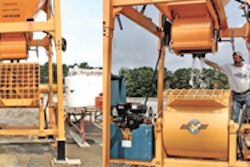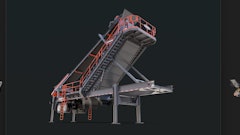In an effort to control the rising costs of materials and the impact that has on the amount of work road agencies can accomplish, there seems to be an increasing trend in the number of warranty projects agencies are awarding to asphalt paving contractors.
Warranty projects place more responsibility on the shoulders of the asphalt producer/contractor, who will be required to have accurate and reliable lab and field testing equipment to ensure pavement quality during placement and the duration of the specified warranty period.
We asked several suppliers of quality control products to respond to the following questions. Here's what they had to say...
Will this warranty project trend require asphalt producers/contractors to beef up their testing capabilities? Please explain.
David Apkarian, president, Transtech Systems Inc.: "Absolutely. No longer will it be acceptable for a contractor to push off QCQA. They will need to take responsibility for testing. Wages will have to increase and be equal to machine operators so the QC tech becomes an interracial part of the crew.
"Experience will be key to the performance of the job, and a contractor's success rate will depend on how they embrace the new idea of Warranties and QCQA."
Wade Collins, vice president, Pavement Technology: "Yes. Depending on the specifications on warranty projects, contractors will need to know how their asphalt mixes will perform prior to placement. Some contractors around the United States are utilizing the Asphalt Pavement Analyzer (APA) and APA Jr. to evaluate their mixes.
"Contractors can use this type of equipment to test their mix designs, the mix they produce at the asphalt plants, and cores from the final in-place compacted mix.
"By monitoring the performance of a mix from the beginning to end, contractors will know how their mixes will perform and will be able to meet the requirements of a warranty project."
Tom Akehurst, Troxler Electronic Laboratories Inc.: "The general consensus of the people we polled is that because the producers are now held accountable for the performance of their work, they will need to do more testing to feel more confident and provide increased supporting documentation to agencies, partly to reduce exposure risk."
Maurice Arbelaez, marketing director, InstroTek Inc.: "Most contractors that I have spoken with have told me that the equipment they have in place can assure quality pavements, but it will mean a tightening of procedures and making sure all testing standards are followed with special attention to key indicators of asphalt performance.
What type of lab testing equipment will asphalt producers need to perform the quality control tests a typical DOT warranty project requires? Detail the basic equipment requirements and what each piece of equipment is designed to test.
Apkarian, Transtech Systems Inc.: "This will vary from state to state and greatly depend if the contractor subs out there testing or elects to perform it all in house. My experience is field related, so I can tell you what is required to perform field testing to ensure quality.
"First and foremost is an experienced quality control technician that has responsibility and authority to perform the job at hand and a work vehicle. A density gauge that is in good working order and is factory calibrated. The user must be trained on its operation — not just safety trained, but trained on how to take readings.
"We can not simply hand the tech a gauge and say, 'Here take readings with this.' We need to have gauges that can obtain fast and accurate readings and be able to interoperate those readings to correct any problems and do this on the fly.
"The ability to profile the mat is imperative. A good working core rig to take samples to test back in the lab for QCQA. A form of communication, a radio or cell phone, so the tech can communicate with the plant and the paving crew/superintendent.
"The ability to have a profiler run at various points in the asphalt production is also imperative. This can be owned or rented as needed. We should be profiling each course of the pavement before a top is placed to prevent reflective cracking from the lower course."
Collins, Pavement Technology: "The APA and APA Jr. are loaded wheel testers that are successfully being used to predict the rutting, fatigue, and moisture susceptibility characteristics of asphalt mixes in an environmentally controlled chamber wet or dry.
"One advantage the APA and APA Jr. offer contractors is they can perform two different types of rut testing (Rut Testing with Hoses and Hamburg Type Testing) and moisture testing.
"This equipment also has frequency drives which allow user to test mixes at multiple speeds and multiple rates of loading. This equipment also has controls to adjust the load. This is important as traffic volume and type may change during the warranty period."
Akehurst, Troxler Electronic Laboratories Inc.: "Much of the same equipment that is used today will still be required:
- Gilson shakers and sieves for determining the gradation of the coarse aggregate
- Ro-tap machine or other sieving device for determining the gradation of the fine aggregate
- Vacuum pump, flasks and other equipment needed to determine the specific gravity of the aggregates
- Gyratory Compactor to design HMA mixes and verify mixes being produced at plant meet requirements of mix design
- Equipment for determining the Gmb of test specimens
- Ignition ovens or Nuclear Asphalt Content Gauges for determining the asphalt content of the HMA material being produced
- Nuclear Density Gauge, non-nuclear density device or core drill for determining the in-place density of the HMA
- Profilograph or other device for determining the smoothness of the pavement."
Will contractors need to verify that mix performance and placement meets typical DOT warranty specifications, or are they simply liable for the pavement performance for the duration of the warranty period? Is the equipment limited to density and smoothness testing?
Apkarian, Transtech Systems Inc.: "If we are talking true warranty programs, the DOT should simply award the contract and allow the contractor to perform their duties. Most contractors know more than the DOTs about how to build and if they are willing to put up the bond for the project, the DOT should not be telling them how to do it.
"The contractor should be liable for the designated term of the warranty only. It's up to the contractor to verify anything if we want to talk about true warranty. Any reasonable contractor will indeed have a very rigorous QCQA plan when they approach these types of projects if nothing else then to protect their investment.
"This QCQA plan will be from start to finish and not be limited to density and smoothness. Density and smoothness may be two of the major factors the contractor needs to worry about or can use as a reference of overall performance, however there are many aspects that will factor into these two measures. We all know that if we achieve the targeted density and smoothness the road will last longer."
Collins, Pavement Technology: "Contractors will most likely be liable for the pavement performance for the duration of the warranty period. However, DOT's may include some parameters in the specification for mix performance and placement. The equipment is not limited to density and smoothness testing. Rut Testing will most likely be included."
Akehurst, Troxler Electronic Laboratories Inc.: "Contractors will need to meet basic applied performance criteria such as smoothness, rideability, lack of potholes, etc., as well as the laboratory performance measures that verify the mixes meet the design specifications. Longer term, where the applied performance may be adjusted over time, we suspect there will be increased requirements placed on the contractors to keep improving their product quality as well as the confidence level of the agencies."
Are there any new developments or trends in asphalt testing that producers/contractors need to keep abreast of in meeting emerging road agency specifications?
Apkarian, Transtech Systems Inc.: "The biggest trend I see on the testing side is development of your quality control tech and elevating the position to equal status on the crew. The development of non-nuclear density gauges has allowed crews to obtain a vast amount of information much quicker than traditional ways in the past."
Collins, Pavement Technology: "We believe the new trend for the future will be Real-Time Quality Control (RTQC) for asphalt and aggregate plants. RTQC simply means testing materials as their being produced, not after they've been produced. Today we have the ability to monitor moisture content, gradation, asphalt content, etc.
"RTQC will allow contractors to continuously monitor materials their plants produce and allow them to make changes to their plants in a timely manner. This will allow contractors to run more materials within specification and reduce their quality control cost."
Akehurst, Troxler Electronic Laboratories Inc.: "The developments we see include permeability, stiffness/modulus, Warm Mix asphalt, and shear measurements for mix designs."
Arbelaez, InstroTek Inc.: "Our company actually has two pieces of equipment that can be used for both mix design and performance testing. The SPT-Asphalt Performance Tester has been heavily backed by FHWA as the future of asphalt performance testing. In the future, we see this product being a staple of any asphalt lab much like a gyratory compactor or NCAT Furnace.
"The CoreDry Rapid Asphalt Drying System is also a laboratory product that uses a method of drying asphalt cores that is super fast — which contractors like — extremely accurate, and does not harm the sample — which DOTs like. Indiana DOT is one of the first DOTs to experiment with asphalt warranties. They have adopted this drying method and now have a CoreDry in each of their district labs."















